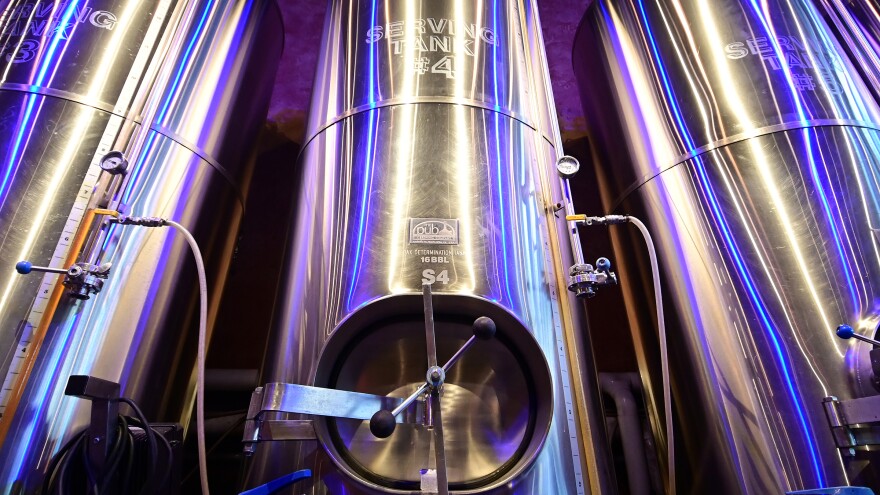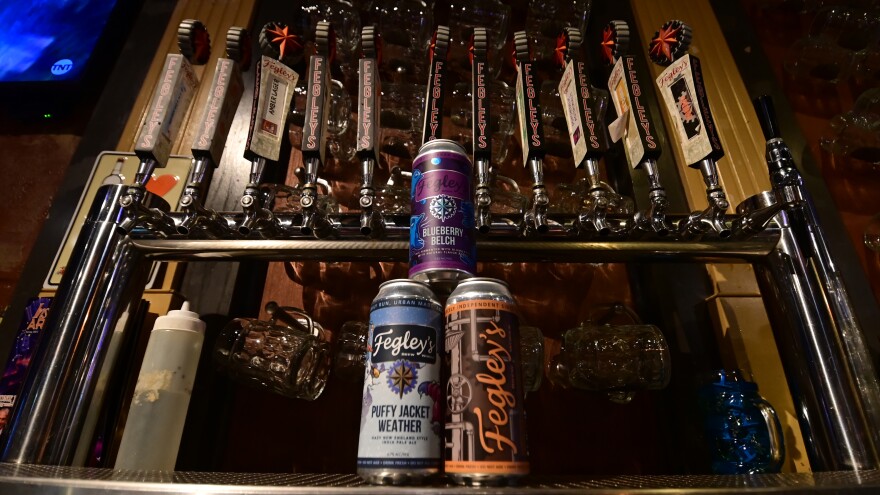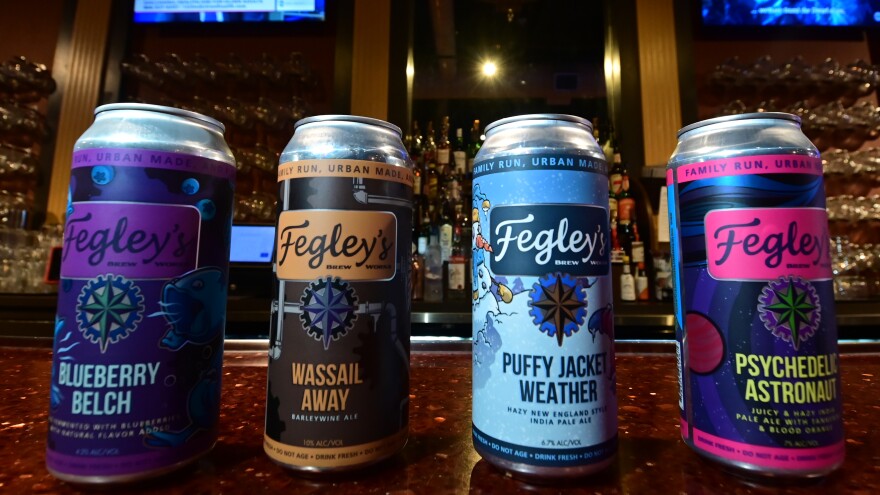EDITOR'S NOTE: LehighValleyNews.com recently spoke to restaurant owners who were candid about the struggles the industry is facing, including inflation, labor challenges and more. Read the full story HERE, including one area that has borne the brunt of the changes.
BETHLEHEM, Pa. — Some restaurant owners across the country, including here in the Lehigh Valley, hold a sense of optimism about the future.
Four years after the devastation of the COVID-19 shutdowns, they continue to persevere in the face of ongoing headwinds.
For others, elevated costs, shrinking labor pools and declining levels of foot traffic leave them wondering how much longer they can remain resilient through the volatility.
LehighValleyNews.com recently spoke to three owners whose restaurants dot the landscape of the Lehigh Valley, including Jeff Fegley, who owns and operates Fegley's Brew Works locations in Allentown and Bethlehem.
Here are his thoughts on a range of subjects, including entrenched issues facing the industry and what the future holds for Brew Works. His responses have been edited for length and clarity.
Q: A new report from the National Restaurant Association says that 38% of restaurants were not profitable last year, and only 27% of those surveyed expect to be more profitable this year. It also said food prices are running about 25% higher than they were last year. And here in Allentown, just right down the street, we recently saw the abrupt closure of Bell Hall. How is business at the Brew Works?
Fegley: “It’s getting harder and harder. We’re older than Bell Hall. We've been here. We opened in 2007, and so we've seen Allentown transition over the years. And we've had different challenges than establishments like Bell Hall, because being pre-NIZ (Allentown’s Neighborhood Improvement Zone) we weren't able to utilize any of the economic development benefits of the NIZ.
"So, it was a little different for us, and it still remains very different for us because we're watching closure after closure. Bell Hall is one thing, but before Bell Hall was Shula’s and a list of some very big names. [Cosmopolitan, Queen City BBQ, Grain, Centro and more].”
Q: What do you think went wrong as you run off that list?
Fegley: “Look at the opening of the Downtown Allentown Market. That market had Chef Robert Irvine. So that was you know, these were all positives. But I think there’s been a lot of, unfortunately just misses. Right?
“I think the PPL [Center] arena took off, everything was awesome. But unfortunately, there were all these brand new restaurants that opened at the exact same time.
“So we were here prior, we were set up, we were a well-oiled machine, we were able to handle it. I mean, we were filling the restaurant, multiple floors, for arena nights. And then as they opened up all these new restaurants, we saw the drop in our sales because it started diluting the market.
“I think Allentown has a specific market, there’s only a certain number of people who are city people who are willing to go from the suburbs to the cities, any city for that matter, but specifically Lehigh Valley cities. So, you’re not talking about the whole Lehigh Valley population as being a market for downtown. There are a lot of people who will refuse to go to downtown Allentown, downtown Easton, downtown Bethlehem. So they’re already eliminated. They’re just suburbanites who will stay suburban. And that’s that.
“So I think what happened here is there was such a rapid development of restaurants. This is just my opinion, but it contributed to the downfall of the restaurants because everyone just started feeding from the same group of people.”

Q: What do you think has to happen next?
Fegley: “At some point, someone has to say, ‘Hey, look, right, let's not spend the tax dollars on new restaurants. Let's spend the tax dollars on the housing and the other aspects of it, but let's try to minimize what's happening in that regard. Because it is unsustainable.”
Q: So how is Allentown Brew Works doing compared with Bethlehem Brew Works?
Fegley: “It is operating at a fraction of Bethlehem brewery sales. And look, the pandemic still affected Bethlehem greatly and we're still feeling the aftermath of that. But it's still a successful, vibrant establishment and that downtown is a very sustainable downtown. You look at the mix of what's there in Bethlehem. None of it is significantly incentivized in any way. It's just the natural, organic growth of that city.”
Q: What’s the next step to try and get people back?
Fegley: “I think what’s important is that you start seeing the perimeters.
“And I think that's also kind of what's happened here is the arena people came in, they got a taste for downtown. But it's different than the suburbs, right? So now, you're still going to come to those arena events, and for the concerts specifically. Those are the biggest hits for the arena. But you're going to go to your local restaurant and then come down for the event and then leave. And there's still that suburban mindset, which is never going to change, in my opinion. That's just why people live in those suburbs, they prefer that way of life. So I'm not knocking that in any way whatsoever. I live in the suburbs.”

Q: So Allentown Brew Works and Bethlehem Brew Works are in two different places right now?
Fegley: “I think right now, looking at Allentown as a whole, the development that's coming out of the NIZ, the structures coming out — it was much-needed, right? We needed to see significant growth. But now you turn to the pandemic, and the pandemic destroyed what was building, and kind of shut it all down. And restaurants were the first to get hit.
“I think we lost all of our talent and that's what the struggle is in the other cities, as well. Suddenly now everyone who was a chef or a cook or server or hostess found other jobs, because the restaurant industry was shut down the worst, so they all found new careers.
“So, we're in a rebuilding stage. And I think that's just going to take a couple more years to generationally get more talent back to our industry.
"And it will recover. I mean, there's no doubt in my mind. But that's part of the negatives, right. And that's, that's probably seeing its worst right now.”
Q: What else has to change?
Fegley: “Sort of what the pandemic hurt for Allentown, specifically moreso than I think it affected Bethlehem or Easton, is that you have big corporations here. And the big corporations occupying the buildings aren't here anymore. Or if they’re here, they're here two to three days a week. And when those workers come in, they go out, they don't stay and hang out here.
“So I think that the other cities are different, you have more mom-and-pop businesses, right? And even the offices are more mom-and-pop. So there's flexible lunches. It's not a strict 9-to-5, and it's definitely not work-from-home. I think that's going to have to change, and what I think politically should be happening is encouraging these businesses to do a return to work.
And I think that even from a federal level, it has to be happening, there has to be some sort of shift to push for the return to work concept.
“I think you're looking at a playing field where I think those corporations are afraid to force their employees back because they will lose their talent, which is very, very possible. Right? So it's not an easy decision. It's not an easy thing to push. And how do you force a corporation to do anything? You really can't, but there should be this new message of ‘we’re going to get back to work.’”
Q: What have you changed about the way you operate?
Fegley: “We've been doing our best to just make less beer strategically to make sure our beer is fresh on the shelves. Other startup breweries can't do that. They need to keep increasing their distribution, because they built their business model on it, whereas ours was built on a restaurant and a whole diversified concept.
“I think we've made some good decisions over the years to make sure that we have multiple means of revenue in real estate, and in the brewery distribution, restaurant, events and banquets.
"But we're feeling the pain, and I wish I could sit here and say, ‘Oh, yeah, it looks great for us right now, in downtown Allentown, specifically.’ It’s a battle, and Bell Hall's closure makes total sense to me.”
Q: What about Bethlehem?
Fegley: “Specifically, our Bethlehem location is looking at a menu remake. But I can tell you, our data suggests that there are core items that people still love. We still see that in casual dining, full service dining, you know, it's still wings, burgers, fries. But our specials sell really well, and we're going to this next menu change. We're expecting to put some new things on there and really see what happens.”
Q: What happens if the tide doesn't turn? As you weather the storm, have you considered what Brew Works might look like in Easton or somewhere else?
Fegley: “We’re in a position where we can hold our breath through this and let’s see what happens. Obviously, we have a relationship with all of our employees. It's a family operation, right? So we're seeing them on a day-to-day basis. So we're always gonna fight as long as we can.
“We know what it's like, adding another brewery. It may not help anything and it may worsen it for [other businesses] and make it not great for us. So what's the point of jumping in there? But Easton makes sense.
“Our approach right now is to conserve. Try to make sure we're not bleeding and try to build sales any way we can. Events and promotions and menu changes and things like that. I think that's really our approach moving forward here first is controlling costs, and making improvements to try to drive more traffic.”




